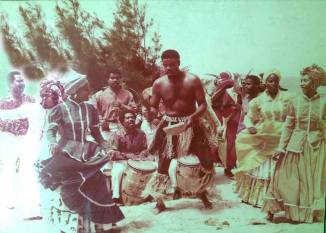La Bomba in Puerto Rico
Tag Archives: Puerto Rico
Rafael Cordero
Rafael Cordero (October, 1790–July 5, 1868), known as “The Father of Public Education in Puerto Rico”, was a self-educated Afro Puerto Rican who provided free schooling to children regardless of their race or social standing.
Cordero was born in San Juan, Puerto Rico into a poor family, his father was a poor man who worked in the tobacco fields. Cordero, who was of African ancestry, was self-educated. His love of literature and his determination to teach and educate himself helped him to develop the skills and preparation to teach primary school.[
At the beginning of the 19th century Rafael Cordero established, in his house, a free school for all children, regardless of race, who were unable to afford an education otherwise. Cordero maintained his educational center for 58 years at Luna Street in San Juan. There he taught reading, calligraphy, mathematics and Catholic instruction.[3] Among the distinguished alumni who attended Cordero’s school were Román Baldorioty de Castro, Alejandro Tapia y Rivera and José Julián Acosta. He proved that racial and economic integration could be possible and accepted.[2]
He was awarded the Premio de Virtud by La Sociedad Económica de Amigos del País, an economic club whose members were friends of Puerto Rico. He was given 100 pesos, which he in turn gave away to those in need. He used half of the money (50 pesos) to buy books and clothes for his students and the other half was given to the homeless.
The people’s love and respect for Cordero was evidenced by the fact that more than 2,000 people attended his funeral in 1868. The Catholic Church plans to search for Cordero’s remains which were buried at the old city’s cemetery, although the exact location is unknown.
To read more go to
http://en.wikipedia.org/wiki/Rafael_Cordero_(educator)
Loiza, Puerto Rico
The First Ever Natural Hair Meet Up in Puerto Rico
Diosas al Natural presents:
The First Ever Natural Hair Meet Up in Puerto Rico / El 1er Encuentro de Pelo Natural en Puerto Rico.
Photos by: Kali Blocker y Joselyn Ponce
Let the Spirit Move You
Let the Spirit Move You is a celebration of ancestral belief systems that are a proud and important part of our cultural legacy as African descendants. The documentary focuses on the African based spiritual traditions that continue in Puerto Rico grounded in ancestral worship – espiristmo. Because of misinformation and preconceptions, to date there is little information on the sacred African traditions that are part of the cultural life of Puerto Rico. These traditions have generally been practiced out of public view and now with the advent of Evangelical types of religions labeling these traditions as “devil worship” many practitioners out of fear are going further underground or giving up these important historical ancestral traditions.
Produced by: Dr. Marta Moreno Vega
Lucecita (Luz Esther Benítez) – musician and activist.
Lucecita (Luz Esther Benítez) – musician and activist.
Lucecita was blacklisted from Puerto Rican television during the early 1970s for her refusal to whiten her appearance and for her support of revolutionary movements in Puerto Rico and Cuba (many Puerto Rican television stations were owned and staffed primarily by white cuban exiles). In response to the harsh criticism she drew due to her adoption of what was referred to by the Puerto Rican press as ‘the African look’, Lucecita released songs that rejected eurocentrism and celebrated the African heritage of Puerto Rico. She also transgressed gendered boundaries by performing in ‘masculine’ outfits, such as suits and tuxedos, which were traditionally never worn by women on stage. In addition to her outfits, Lucecita often used masculine adjectives in her songs and interviews, sometimes interchanging between masculine and feminine. The catholic church and homophobia were also targets of Lucecita, both of which she openly criticized throughout the 1970s.
I am not a puppet – Luz Esther Benítez
Lucecita, 1973
“I am not a puppet, I never wanted to be that but they [the television industry] wanted to erase the blackness that is part of me. They forgot that my father was black. They wanted to refine my nose. They demanded a white Lucecita, who would fill up their requirements. I felt bad but accepted. They told me that it was going to be better for me and I believed them. But the day they took away my Afro, I cried and cired… I still remember and it hurts.”
(Yeidy Rivero, Tuning Out Blackness: Race and Nation in the History of Puerto Rican Television.)
(original quote from García Ramis, “La transformación.”)
Being called exotic in Puerto Rico
“women with black eyes and hair and darker skin are described in Puerto Rico as exotic. Nonetheless this physical type constitutes the majority of women in Puerto Rico. Thus, for Puerto Ricans, the logical thinking would be to consider a blond or a red haired woman as exotic. But no, our aesthetic models continue to be eurocentric therefore, we are exotic to ourselves.”
— Antonio Martorell, Ensayo de una mirada: La estética caribeña








